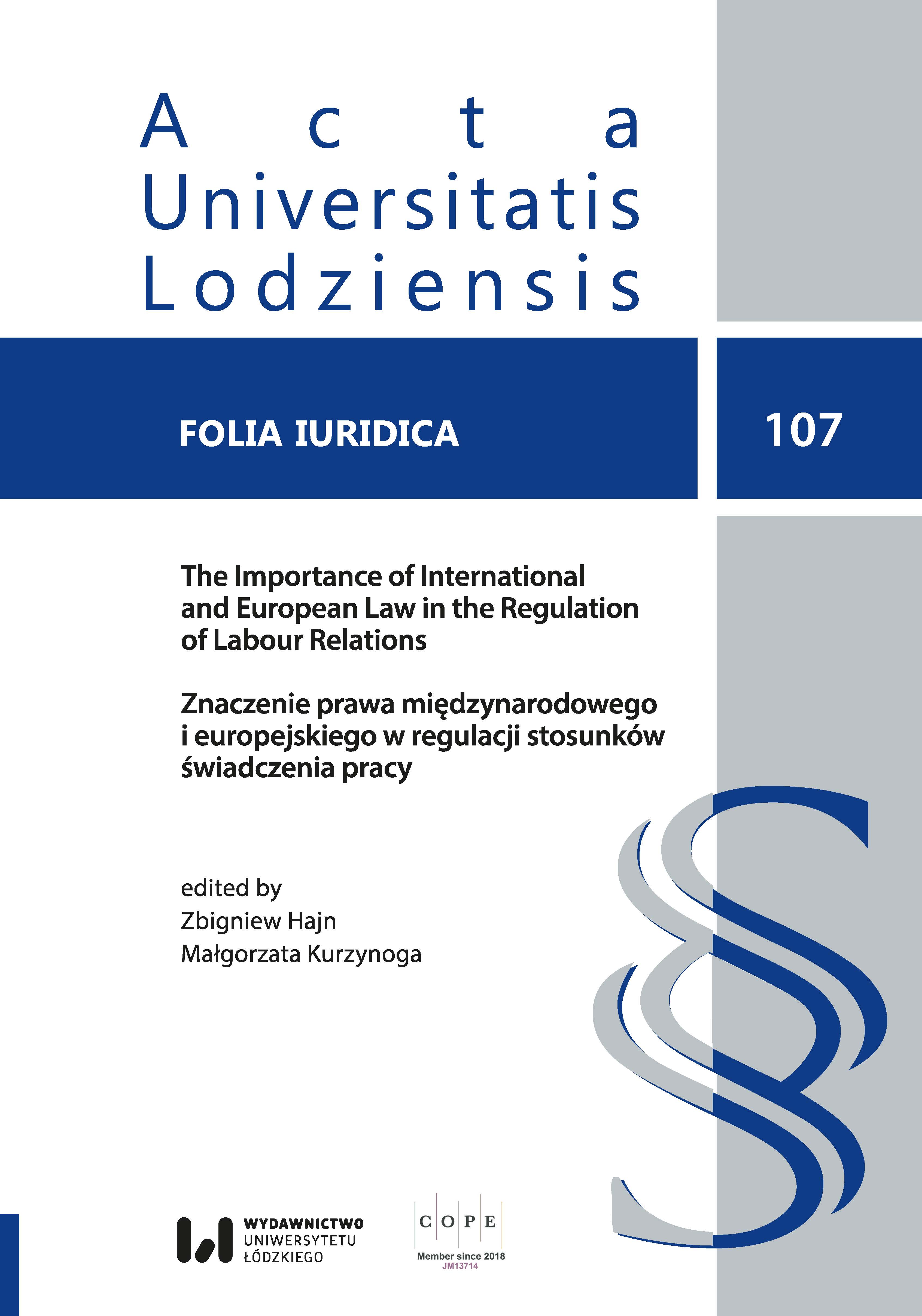Rola Międzynarodowej Organizacji Pracy w kształtowaniu warunków pracy w przemyśle tekstylnym
DOI:
https://doi.org/10.18778/0208-6069.107.11Słowa kluczowe:
przemysł tekstylny, prawa pracownicze, MOP, praca dzieci, godziwe wynagrodzenie, warunki pracyAbstrakt
Na przestrzeni lat troska o odpowiednie warunki pracy i przestrzeganie praw pracowniczych w przemyśle tekstylnym stała się coraz bardziej widoczna. Międzynarodowa Organizacja Pracy (MOP) odgrywa kluczową rolę w kształtowaniu i poprawie warunków pracy w tym sektorze gospodarki. Niniejszy artykuł ma na celu zbadanie kluczowych aktów prawnych i inicjatyw pozalegislacyjnych podejmowanych przez MOP w tym zakresie. Autorka odwołuje się do tekstów konwencji, opracowań MOP i innych organizacji, a także literatury z zakresu prawa. Przeprowadzone rozważania wskazują, że działania MOP pozytywnie wpłynęły na praktyki stosowane w przemyśle tekstylnym na całym świecie. Niemniej jednak, autorka postuluje przyjęcie konwencji poświęconej prawom pracowniczym w tej gałęzi przemysłu, propagującej uczciwe i zrównoważone praktyki, które przyniosą korzyści pracownikom, przedsiębiorstwom i całej gospodarce.
Pobrania
Bibliografia
Berik, Günseli. Yana Van Der Meulen Rodgers. 2010. “Options for Enforcing Labour Standards: Lessons from Bangladesh and Cambodia.” Journal of International Development 22: 56–85.
Google Scholar
Góral, Zbigniew. Aneta Tyc. 2019. “Konwencje i zalecenia Międzynarodowej Organizacji Pracy.” In System Prawa Pracy. Vol. 9. Międzynarodowe publiczne prawo pracy. Standardy globalne. 64–65. Ed. by Krzysztof W. Baran. Warszawa: Wolters Kluwer.
Google Scholar
ILO. 2019. The future of work in textiles, clothing, leather and footwear. Working Paper No. 326. Geneva: International Labour Organization. https://www.ilo.org/wcmsp5/groups/public/---ed_dialogue/---sector/documents/publication/wcms_669355.pdf
Google Scholar
ILO. 2019a. Promoting Decent Work in Garment Sector Global Supply Chains. Highlights and Insights from the ILO project Labour Standards in Global Supply Chains: A Programme of Action for Asia and the Garment Sector (LSGSC). Geneva: International Labour Organization. https://www.ilo.org/wcmsp5/groups/public/---ed_protect/---protrav/---travail/documents/projectdocumentation/wcms_681644.pdf
Google Scholar
ILO. 2020. The supply chain ripple effect: How COVID-19 is affecting garment workers and factories in Asia and the Pacific. Geneva: International Labour Organization. https://www.ilo.org/wcmsp5/groups/public/---asia/---ro-bangkok/documents/briefingnote/wcms_758626.pdf
Google Scholar
ILO. 2022. Employment, wages and productivity trends in the Asian garment sector Data and policy insights for the future of work. Geneva: International Labour Organization. https://www.ilo.org/wcmsp5/groups/public/---asia/---ro-bangkok/documents/publication/wcms_848624.pdf
Google Scholar
ILO. 2022a. Employment, wages and productivity trends in the Asian garment sector Data and policy insights for the future of work. Geneva: International Labour Organization. https://www.ilo.org/wcmsp5/groups/public/---asia/---ro-bangkok/documents/publication/wcms_848624.pdf
Google Scholar
ILO. 2022b. The future of work and skills in the textiles and clothing sector Anticipating skills needs and finding solutions through social dialogue in Brazil, Ethiopia, Jordan and Peru. Geneva: International Labour Organization. https://www.ilo.org/wcmsp5/groups/public/---ed_dialogue/---sector/documents/publication/wcms_855495.pdf
Google Scholar
ILO. 2022c. Safety and health in textiles, clothing, leather and footwear. Code of practice. Geneva: International Labour Organization. https://www.ilo.org/wcmsp5/groups/public/---ed_dialogue/---sector/documents/normativeinstrument/wcms_828429.pdf
Google Scholar
ILO. 2023a. Challenges and opportunities to advance decent work in five countries and supply chains: A synthesis report. Geneva: International Labour Organization. https://www.ilo.org/wcmsp5/groups/public/---ed_dialogue/---sector/documents/publication/wcms_876572.pdf
Google Scholar
ILO. 2023b. Canada ILO cooperation. Geneva: International Labour Organization. https://www.ilo.org/wcmsp5/groups/public/---dgreports/---exrel/documents/publication/wcms_342563.pdf
Google Scholar
Islam, Tanweer. 2022. “Health Concerns of Textile Workers and Associated Community”. Inquiry: a journal of medical care organization, provision and financing: 59. https://doi.org/10.1177/00469580221088626
Google Scholar
Kabir, Humayun. Myfanwy Maple. Md Shahidul Islam. Kim Usher. 2022. “A qualitative study of the working conditions in the readymade garment industry and the impact on workers’ health and wellbeing.” Environmental and Occupational Health Practice 4(1). https://doi.org/10.1539/eohp.2021-0020-OHW
Google Scholar
Karanikas, Nektarios. Sikder Mohammad Tawhidul Hasan. 2022. “Occupational Health & Safety and other worker wellbeing areas: Results from labour inspections in the Bangladesh textile industry.” Safety Science 146. https://doi.org/10.1016/j.ssci.2021.105533
Google Scholar
Koliev, Faradj. 2022. “Promoting international labour standards: The ILO and national labour Regulations”. The British Journal of Politics and International Relations 24(2): 361– 380. https://doi.org/10.1177/13691481211027513
Google Scholar
Peksen, Dursun. Blanton, Robert G. 2017. “The impact of ILO conventions on worker rights: Are empty promises worse than no promises?” The Review of International Organizations 12: 75–94. https://doi.org/10.1007/s11558-015-9241-9
Google Scholar
Smith, P. 2023. “Global apparel market – statistics & facts.” Statista. https://www.statista.com/topics/5091/apparel-market-worldwide/#topicOverview (accessed: 30.09.2023).
Google Scholar
BBC News. 2013. “Bangladesh factory collapse toll passes 1,000.” BBC, https://www.bbc.com/news/world-asia-22476774
Google Scholar
Better Work. 2022. “Research.” https://betterwork.org/research/ (accessed: 30.09.2023).
Google Scholar
Better Work. 2023. “The Programme.” https://betterwork.org/programme/ (accessed: 30.09.2023).
Google Scholar
Better Work 2023a. “Better Work’s Global Compliance Assessment Tool (CAT).” https://betterwork.org/reports-and-publications/better-works-global-compliance-assessment-tool/ (accessed: 30.09.2023).
Google Scholar
Britannica. 2023. “Topic: textile.” https://www.britannica.com/topic/textile (accessed: 30.09.2023).
Google Scholar
European Commission. n.d. “Textiles, leather and fur industries.” https://single-market-economy.ec.europa.eu/sectors/textiles-ecosystem/textiles-leather-fur_en (accessed: 30.09.2023).
Google Scholar
ILO. 2000. “Memorandum of the 88th Session of the International Labour Conference.” https://www.ilo.org/public/english/standards/relm/ilc/ilc88/memo.htm#VII.%20Withdrawal%20of%20Conventions%20Nos.%2031,%2046 (accessed: 30.09.2023).
Google Scholar
ILO. 2018. “CLEAR Cotton: Eliminating child labour and forced labour in the cotton, textile and garment value chains: an integrated approach.” https://www.ilo.org/wcmsp5/groups/public/@ed_norm/@ipec/documents/publication/wcms_650173.pdf (accessed: 30.09.2023).
Google Scholar
ILO. 2018a. “Bangladesh: Improving safety in the garment industry.” https://www.ilo.org/global/about-the-ilo/mission-and-objectives/features/WCMS_615495/lang--en/index.htm (accessed: 30.09.2023).
Google Scholar
ILO. 2019b. “SIRAYE: A programme on Advancing Decent Work and inclusive industrialization in Ethiopia.” https://www.ilo.org/africa/technical-cooperation/WCMS_687547/lang--en/index.htm (accessed: 30.09.2023).
Google Scholar
ILO. 2023. “Textiles, clothing, leather and footwear sector.” https://www.ilo.org/global/industries-and-sectors/textiles-clothing-leather-footwear/lang--en/index.htm (accessed: 30.09.2023).
Google Scholar
ILO. 2023b. “How International Labour Standards are created.” https://www.ilo.org/global/standards/introduction-to-international-labour-standards/international-labour-standards-creation/lang--en/index.htm (accessed: 30.09.2023).
Google Scholar
ILO. 2023c. “Social Dialogue and Tripartism.” https://www.ilo.org/global/topics/workers-and-employers-organizations-tripartism-and-social-dialogue/lang--en/index.htm (accessed: 30.09.2023).
Google Scholar
PWN. n.d. “Hasło: włókiennictwo.” https://encyklopedia.pwn.pl/haslo/wlokiennictwo;3997162.html (accessed: 30.09.2023).
Google Scholar
Pobrania
Opublikowane
Wersje
- 2024-08-06 - (2)
- 2024-06-30 - (1)
Jak cytować
Licencja

Utwór dostępny jest na licencji Creative Commons Uznanie autorstwa – Użycie niekomercyjne – Bez utworów zależnych 4.0 Międzynarodowe.














